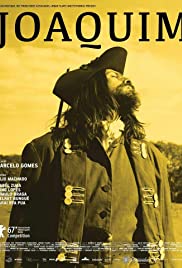
JOAQUIM
Brazil, 2017, 97 minutes, Colour.
Julio Machado.
Directed by Marcelo Gomez.
This is a Brazilian film set in the 18th century in the countryside of Brazil.
It opens very strikingly, a head on a pike outside a church and a voice-over from the dead man explaining who he was, his being part of the military authority, his search for gold on behalf of the authorities, his wanting gold for himself – but also his reading books, learning some of the philosophy of the Americans of the 18th century and their human rights and freedom, leading him to become part of revolutionary action, but his being executed, the only one of the group beheaded and drawn and quartered.
The film then goes back to see him in his activities, on expeditions and dealing with his fellow officials as well as his personal servant, slave, and local Indians. He is part of a checkpoint where the authorities examine the gold findings and see if they are authentic or not, and will lead to further exploration. There is a servant on the checkpoint, an Indian, Blackie, who serves the food, interacts with all the people, has a sexual relationship with Joachim. Later she disappears.
Joachim has some new energy, his hair is cut by Blackie, he is asked to lead a group to go out into the countryside and prospect. The group spends a lot of time, panning in the rivers. But then food and supplies dwindle and the men demand that they return to the checkpoint, Joachim unwillingly. On his return, he gives some of his findings to the governor who makes all kinds of promises then steals the findings and goes to Rio. Joachim has read a great deal, being given books by a poet. He then goes out by himself to find gold, encounters the Indians who are hostile to him, but especially Blackie who stands against him. He is released and goes back to the checkpoint.
Religion has been absent from the film but now Joachim meets a priest who is associated with a revolutionary movement, along with the poet, and Joachim commits himself to action. There is a dinner scene with most of the people concerned, discussions about revolution – and then the film ends. We have seen the ending at the beginning of the film.
This is more of film for historians of Latin America and those interested in the revolutionary movements on that continent.